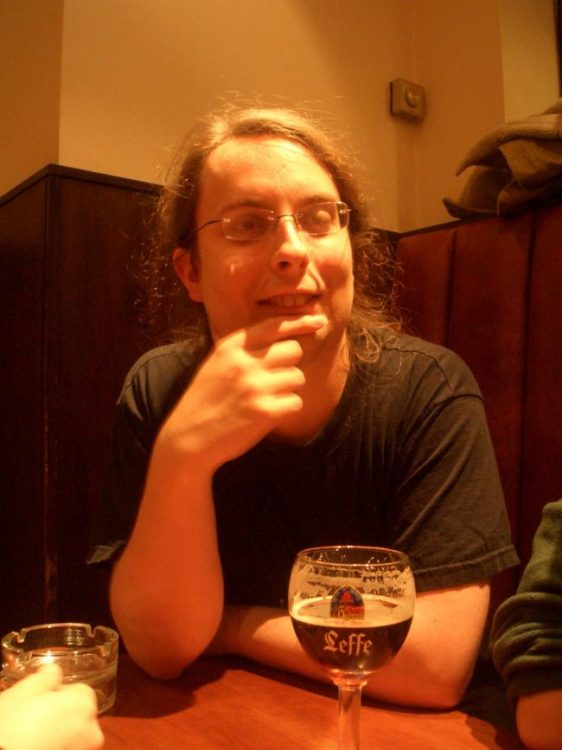Machinima founder, and VR Developer
Born: August 30, 1977
Died: February 5, 2018
 Hugh Hancock, who died unexpectedly of a heart attack in February, was essentially a storyteller, but one for whom the written word was never quite enough. Instead, in the late 1990s he helped develop a new form of underground, guerrilla film-making, which took advantage of the high-speed (for the time) graphics and animation techniques found in off-the-shelf computer games. More recently, his focus had switched to Virtual Reality; his Edinburgh-based Strange Company had released the “seminal” VR game Left-Hand Path only last year.
Hugh Hancock, who died unexpectedly of a heart attack in February, was essentially a storyteller, but one for whom the written word was never quite enough. Instead, in the late 1990s he helped develop a new form of underground, guerrilla film-making, which took advantage of the high-speed (for the time) graphics and animation techniques found in off-the-shelf computer games. More recently, his focus had switched to Virtual Reality; his Edinburgh-based Strange Company had released the “seminal” VR game Left-Hand Path only last year.
Born in Bristol, Hugh moved up to Edinburgh to study computing, but dropped out after his first year at university, largely because of his growing interest in what he would help name “machinima”—derived from the words “machine” and “cinema,” with a nod to Japanese anime. Essentially, he and other teens and early 20-somethings were hacking the graphic software potential in computer games such as Doom and Quake II to tell original stories, with their characters and cameras controlled in real time – like virtual puppets – by the joysticks and keystrokes normally used in game-play.
Back in 1997, Paul Younger owned Edinburgh’s Reality-X, arguably the world’s first video game cafe. “Hugh approached me to talk about creating a movie using the Quake engine,” he said. “At the time we thought he was a little mad but agreed to offer our services – we had access to 20 PCs on a network. His vision was right up our street and our customers were eager to help.”
Over the next few weeks, Hugh and his team “shot” his first movie, Eschaton, although it wasn’t always easy in terms of either technology or cast. “I have fond memories of Hugh shouting across the room telling the ‘actors’ to stop throwing grenades while he was trying to set scenes,” Paul explained. “Eschaton was an ambitious project but Hugh managed to pull it off back in a time where PC technology wasn’t exactly stellar. Nothing phased Hugh, he was always up for a challenge and wanted to push boundaries.”
In May 1999 Hugh and Gordon McDonald, an artist and filmmaker he’d met through the University of Edinburgh’s role-playing game society GEAS, formed a limited company. The deliberately-named Strange Company would eventually produce numerous independent films – such as Death Knight Love Story, created in World of Warcraft – as well as commercials for the BBC, Electronic Arts and many others.
Hugh’s position as a founding father of machinima was cemented in 2000 when he and Gordon founded an online hub enabling this new generation of filmmakers to communicate and share their work. “This grew from us making movies, but having no reliable way of distributing them – this being before YouTube,” Gordon explained. In time, they sold machinima.com for a five-figure sum. Hugh would subsequently be “rather proud” when – in 2016, with the site reaching nearly 150 million viewers each month – its new owners opted to sell to Warner Brothers in a deal that valued the company at nearly $100 million.
Hugh was invited to speak about his work all around the world, at Game Developers’ Conferences and international animation festivals; he also wrote “Machinima for Dummies”. Given their near-zero budgets, however, his films still took multiple years to make. Gordon suggests that Hugh’s move into VR was perhaps inevitable. “I think Hugh had pushed it as far as he could go. Also, the feedback he found in the VR community was immediate by comparison.”
News of Hugh’s totally unexpected death spread just as quickly through social media and online, underscoring how his legacy will likely be in those he has influenced. as much as his work. “He developed and progressed so many fields, and mentored people, people who learned from him,” Gordon explained.
“Hugh was a good friend while I lived in Edinburgh running the cafe and helped us with our game launch events too,” Paul agreed. “I can say that he did have an influence on my early career in video games; he really helped me get excited about the sector – and 21 years I’m still here. He always had time for people, and in this industry, that can be rare.”
“If there was one thing that really stood out with Hugh, it was his enthusiasm,” Paul added. “It was infectious. You couldn’t help but get excited about whatever project he was currently working on or thinking about. It was this enthusiasm that helped him create some fantastic experiences whether it was through his machinima work, or his excellent VR title Left-Hand Path. He single-handedly created one of the most brilliantly immersive gaming experiences I’ve ever encountered, and a game that I’m convinced will be looked back on as a crucial lynchpin in the evolution of a whole new type of interative digital storytelling.”
Hugh is survived by his mother, and his partner.